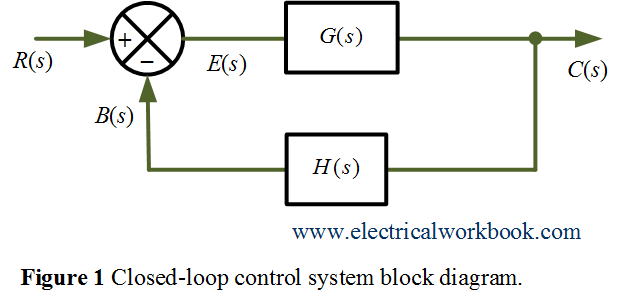After reading this topic static error constants (position (Kp), velocity (Kv) and acceleration (Ka)) or coefficients in the control system, you will understand the theory, expression, and derivation.
Consider a simple closed loop control system with negative feedback as shown below in Figure 1.

where R(s) is the input signal, B(s) is the feedback signal, C(s) is the output signal, G(s) is the forward gain, H(s) is the feedback gain and error signal E(s) is the difference between input R(s) and feedback signal B(s).
Static position error constant
Static position error constant ${K_p}$ is associated with step Input signal applied to a closed loop control system. The step input signal is
\[R(s) = \frac{A}{s}….(1)\]
Steady-state error is given as
\[{e_{ss}} = \mathop {\lim }\limits_{s \to 0} \frac{{sR(s)}}{{1 + G(s)H(s)}}…..(2)\]
Put Equation 1 in Equation 2,
\[{e_{ss}} = \mathop {\lim }\limits_{s \to 0} \frac{{s(A/s)}}{{1 + G(s)H(s)}}\]
\[ = \frac{A}{{1 + \mathop {\lim }\limits_{s \to 0} G(s)H(s)}}\]
\[ = \frac{A}{{1 + {K_p}}}\]
where,
\[{K_p} = \mathop {\lim }\limits_{s \to 0} G(s)H(s)\]
${K_p}$ is called the static position error constant.
Static velocity error constant
Static velocity error constant ${K_v}$ is associated with ramp Input signal applied to a closed loop control system. The Ramp input signal is
\[R(s) = \frac{A}{{{s^2}}}…..(3)\]
Steady-state error is given as
\[{e_{ss}} = \mathop {\lim }\limits_{s \to 0} \frac{{sR(s)}}{{1 + G(s)H(s)}}….(4)\]
Put Equation 3 in Equation 4,
\[{e_{ss}} = \mathop {\lim }\limits_{s \to 0} \frac{{s(A/{s^2})}}{{1 + G(s)H(s)}}\]
\[ = \frac{A}{{\mathop {\lim }\limits_{s \to 0} s + \mathop {\lim }\limits_{s \to 0} sG(s)H(s)}}\]
\[ = \frac{A}{{0 + \mathop {\lim }\limits_{s \to 0} sG(s)H(s)}}\]
\[ = \frac{A}{{{K_v}}}\]
where,
\[{K_v} = \mathop {\lim s}\limits_{s \to 0} G(s)H(s)\]
${K_v}$ is called the static velocity error constant.
Static acceleration error constant
Static acceleration error constant ${K_a}$ is associated with ramp Input signal applied to a closed loop control system. The Parabolic input signal is
\[R(s) = \frac{A}{{{s^3}}}…..(5)\]
Steady-state error is given as
\[{e_{ss}} = \mathop {\lim }\limits_{s \to 0} \frac{{sR(s)}}{{1 + G(s)H(s)}}….(6)\]
Put Equation 5 in Equation 6,
\[{e_{ss}} = \mathop {\lim }\limits_{s \to 0} \frac{{s(A/{s^3})}}{{1 + G(s)H(s)}}\]
\[ = \frac{A}{{\mathop {\lim }\limits_{s \to 0} {s^2} + \mathop {\lim }\limits_{s \to 0} {s^2}G(s)H(s)}}\]
\[ = \frac{A}{{0 + \mathop {\lim }\limits_{s \to 0} {s^2}G(s)H(s)}}\]
\[ = \frac{A}{{{K_a}}}\]
where,
\[{K_a} = {\mathop {\lim }\limits_{s \to 0} {s^2}G(s)H(s)}\]
${K_a}$ is called the static acceleration error constant.